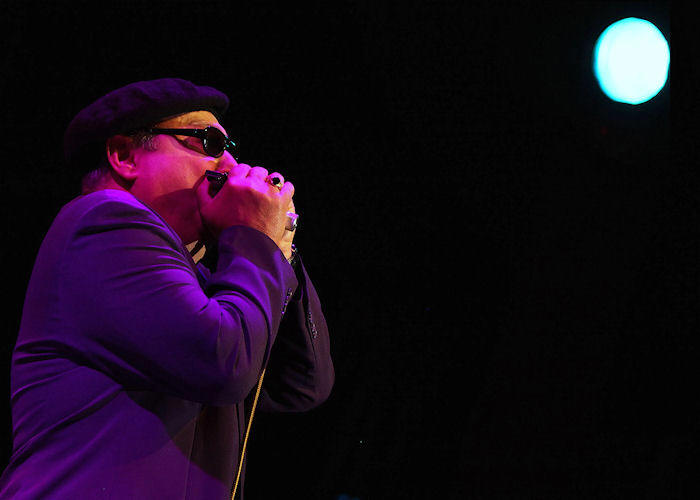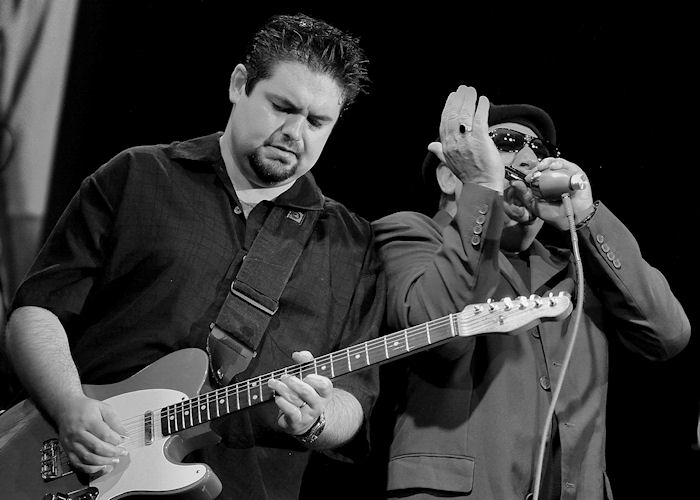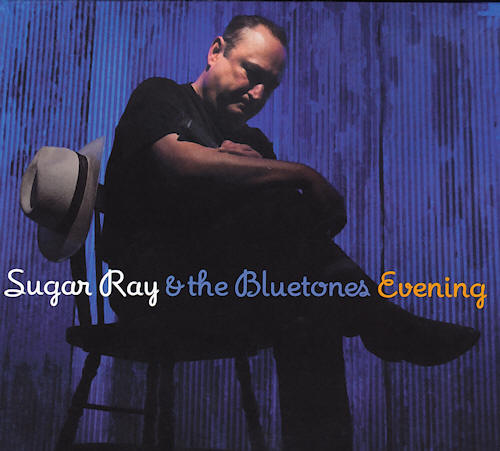
Painting © 2004 Loz
Arkle
Website
© Copyright 2000-2011 Alan White - All
Rights Reserved
Site optimised for Microsoft Internet Explorer
Early Blues Interview
|
|
|
_________________________________________________________________________ I caught up with Sugar Ray at The Burnley Blues Festival 2012. Alan: What are your first musical memories growing up in Connecticut and then Rhode Island? Sugar Ray: My Dad was a musical teacher, a voice teacher, my brother is a singer and piano player so when I was a little child I used to hear my uncles on bass, my brother on guitar, my mother singing so there was always a lot of music around me. My father told me that he used to sing to me in the womb so I guess that’s where it started, before I even came into the world.
Sugar Ray: At junior high school I always liked to be near a stage. I usually got the main role in plays, especially if it involved singing, so the entertaining part of it was in me. My father was never a performer, he was a teacher, so he kind of lived his dream through me, seeing me perform. They write a saying under your Year Book entry at school and mine said “Life is a Stage” and it was pretty prophetic. Alan: What kind of material were you playing in the early days? Sugar Ray: It’s always been blues although in the very early early days before I knew the blues I listened to folk singers through the radio as a young teenager. Where I grew up in Rhode Island, Connecticut area, many many musicians come from that area, like Duke Robillard, Johnny Nicholas, Roomful of Blues, they surrounded me and they all had massive record collections. We used to make sojourns to Boston which was about 2 hour drive once or twice a month just to buy albums from these cool record shops and come home with armloads of blues records by people you’d never heard of. Then, when I was still in school friends were forming a band and asked me if I wanted to sing. They gave me an Elmore James record, I said, “Yeah, I’ll try that” so that was the start and I’ve never looked back. I didn’t play harp for quite a few years, I was just a singer.
Alan: So how did you get introduced to the harp? Sugar Ray: My father was an unbelievable harp player, not in the blues vein but in country straight blue-grass country harp, camp fire songs, they were really good. Again people in school gave me the records, I think the first harp record was Hate to See You Go by Little Walter. My friend brought in a record by Big Walter and I’d never heard this stuff before but I put it on the turntable and tried to decipher it for years and years. I never had anybody to teach me what key they were using, how to get that sound, it took years and years. Now we have wonderful harmonica teachers out there but back then it took me a long time to figure it out. We had a harp player in the band, my early band, but he got drunk a lot and didn’t show up at the gigs so I slowly but surely played when he didn’t show up and then finally told him to stay home because we didn't need him no more! Alan: How did you get the nickname “Sugar”? Sugar Ray: "Jocko" Wimpfeimer was a great drummer from my area back in the 70s. He’s left this world now but I remember we were just driving in the car one day when we were still kids and I remember he said, “Your voice sounds so sweet, as sweet as sugar, Ray”, and it just stuck like glue and it's been with me ever since. Alan: What first attracted you to the blues? Sugar Ray: It's such a deep emotional feeling that you could use to express yourself through music. I love expressive music, I love country music as well because that tells a story and it's got melodies. Alan: Your voice has been described as having 'a robust tone making it one of the most distinctive, well defined and recognisable instruments in modern blues' and I read when you first heard B.B. King, Big Joe Turner and John Lee Hooker singing 'behind the beat' and it "blew your mind", what does it really mean and how has it influenced you? Sugar Ray: Well, in classical music you have notes written out and you stick to them rigidly, but in the blues you can play around with the time, come in a little bit before the band, stop before the band, of the 12 bars just sing for 10, stop and come in again at another weird place. A lot of these old blues guys did it unintentionally because they really didn’t know where they were musically but when you listen to it it’s beautiful. That’s what blew my mind, it’s kind of hard to explain and to do it intentionally is a whole other ball game but I just love the flexibility of improvising with the time as well as with the melody. Alan: So who has influenced you most in your music writing and playing? Sugar Ray: Writing? It was something that came to me out of necessity because record companies were saying they didn’t want covers. A lot of it’s economical because they can make money off a song they can publish with you but it made sense to me anyway because to write your own material is to create your own self, your own identity. It’s a never ending process but I think I’m getting better at it but sometimes I have to make myself create. Some people say “I’m going to write a song about that” when they’ve heard something but sitting down in a room and thinking, “Okay, I’m going to write a song now” is a whole different thing but I’m finding I can do that now. Sometimes it flow out real quickly and I can’t write fast enough and other times it takes weeks. Alan: Tell me a little about your time with Duke Robillard's band Roomful of Blues, when did you get to know them and how did you become lead vocalist of the band? Sugar Ray: I grew up with them, and when I was underage, 15 or 16, I would sneak into the local club called the Knickerbocker Cafe, Westerly, Rhode Island and hear them. I always loved them, especially the early days and they brought in artists from all over the world, Sil Austin, Cleanhead Vinson, Ruth Brown, the list is really long. The band was smokin’ with a killer horn section and I would be witnessing all this, and thinking “Oh my God”. I would dream, literally have dreams at night, that I had a band like that behind me. I like Jump music as well as I like Chicago Blues and then it came true and it was actually that band that hired me, amazing.
Alan: You had a "Best Traditional Blues" Grammy nomination in 1999 for ' Superharps', a collaboration with fellow harmonica virtuosos James Cotton, Charlie Musselwhite and Billy Branch; tell me a little about the experience. Sugar Ray: I got a phone call one today from Randy Labbe, the producer, and he said “Would you like to be on a record deal with Charlie Musselwhite?”, so I said, “Err, let me think about it...YES”. That’s one of those times when, fortunately I’m good under pressure, so this was a week and a half away and I had to go to a little recording studio in Maine, New England. I immediately sat down and wrote all three songs for that session. Nobody else wrote their own material and they were like...”You son of a Bitch, you’ll make more money, man ...” but I just like to write my own stuff! Alan: Tell me about members of the Bluetones, their backgrounds, how and when did you all get together? Sugar Ray: Well, there’s me and Mudcat Ward the bass player, Neil Gouvin on drums, and Anthony Geraci we are pretty much the original Bluetones in the late 70s with Ronnie Earl, and we are pretty much still together. We’ve all done other stuff, like I went with Roomful for a few years, Mudcat played with The J. Geils Band, Anthony had his own band, but we’ve always been a family with barbeques and wives got along. And now we are back together and took all the experiences that we collected through all those years and we've brought it back together, it’s powerful stuff man. And we have Mike Welsh on guitar, he’s an amazing guitar player. When he was about 13 he was in Boston and he opened the original House of Blues with Dan Akroyd who named him Monster Mud Walsh. He hired my rhythm section and they played on Monday nights with Mike for years and years on the side and then finally we came together and he joined me and there’s some really magic stuff that goes on when we play together. It’s a really good place to be.
Alan: After you started the original Bluetones you performed with Big Walter Horton, Big Mama Thornton, Big Joe Turner, J.B. Hutto and Roosevelt Sykes; you must have some fond memories of those days. Sugar Ray: Great memories, absolutely. Picking up Otis Rush at the train station and staying at my home, eating Thanksgiving dinner with J. B. Hutto, going on the road with Big Walter. J. B. Hutto, Left Hand Frankie and Otis Rush all the same vehicle! Oh the memories! I just wish we’d had the foresight to record some of them shows, but you can’t kill the memories. Alan: Tell me about the making of your latest exceptional blues album 'Evening'; how would you describe the music compared to your previous albums, and are all the tracks originals? Sugar Ray: Most of it’s original material and there wasn’t a lot of preparation. We decided that it was best to go in and be who we are, let’s just be ourselves and play straight-ahead blues as we’ve always done, and just have a ball. Right up to a week before I had ideas, I had some lyrics written down on the back of a napkin, just ideas of how the song should go, and then in the studio before they rolled the tape I would take the band into a huddle like a football team and explain to the band, “I want it to go like this...” and Mike Walsh would go, “How about if we just do this...” and I’d say, “Yes, that’s even better...” and in 10 minutes we’d go, “Okay, we’re ready”. That's how we recorded that record. The one's that we covered, like My Love Will Never Die [aka You Know My Love], we've been playing them on stage for years. Alan: Unusually, I believe you played a Native American flute on Dancing Bear? Sugar Ray: I sure did and I don’t think it’s ever been done. I have an authentic plains indian teepee at home and I like to sit in there with the fire going, and I love creative music, any kind, the good old country music, a good classical piece that really moves me, whatever, and the flute just attracted me from the moment I heard it, like hawaiian music and the steel pedal, that kills me too. But the flute just reached into my soul and I thought I’ve just got to get one of those. I bought it in Colorado and it came to me like harmonica, no lessons, just started playing. One day I thought I wanted to put some flute on a blues record so I took it to a session and I thought that David Earl, the owner of Severn Records, would say “Nooo way” but he was very encouraging and said, “Oh absolutely, let’s try that”. My only regret is that I didn’t do it more, play longer. Alan: Of all the songs that you play, do any of them have special meaning to you? Sugar Ray: I do a Big Walter Horton medley, three tunes, and he actually did it himself when he played with us. That Ain’t It as it’s called and then he would go into another rhythm of St Louis Blues kinda thing. So what I did was to take the two of them together and at the end of it I’d play Don’t Get Around Much Anymore and make it into a three-piece. Whenever I play that the memories come back of Walter. That's special that nobody but the band would know about. Alan: Sugar Ray, thank you so much, I really appreciate it. Sugar Ray: You're very welcome.
_________________________________________________________________________
Sugar Ray Norcia & the Bluetones / Evening Severn CD 0052
"THIS is more like it! This is what drew me to
Sugar Ray Norcia way back when and why I've followed his career ever
since. I've got most of Sugar Ray's recorded output, with and without
the Bluetones, and I've always preferred the releases on which he get
down and dirty, nitty and gritty with his harmonica tones the best. Oh,
I've found his work with the Roomful of Blues pleasant, and his forays
off into Sinatra-land enjoyable enough, but the straight ahead,
down-in-the-alley blues is just where my blues taste buds reside. The
low down, gut bucket stuff, and the scruffier, the better..." www.sugarrayandthebluetones.com _________________________________________________________________________
Return to
Blues Interviews List |








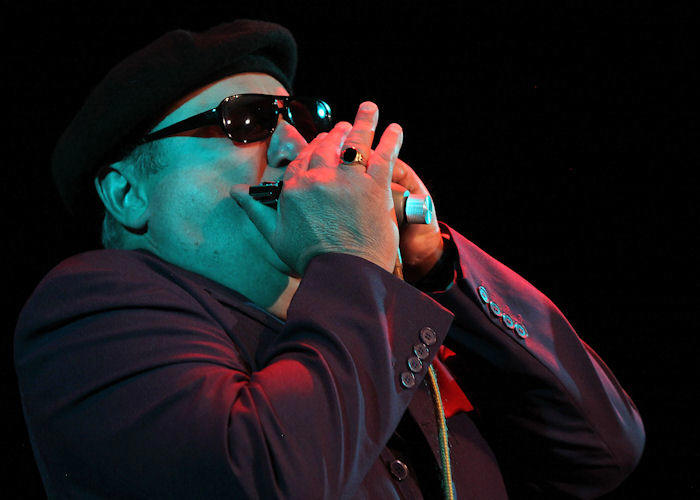
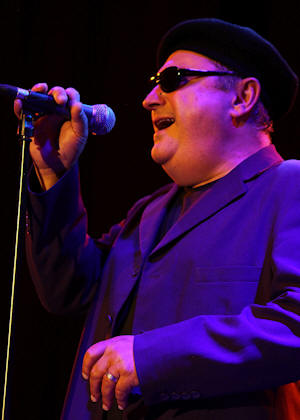 Alan:
Did you always want to become a professional musician?
Alan:
Did you always want to become a professional musician?